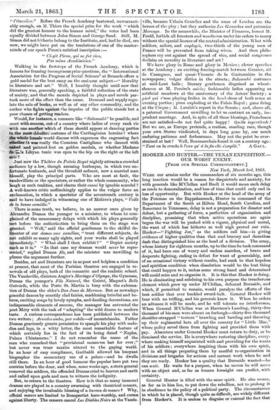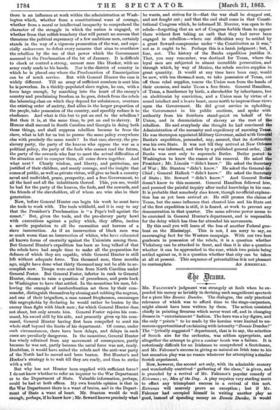HOOKER AND HUNTER.—THE TEXAN EXPEDITION.— OUR WORST ENEMY.
[FROM OUR SPECIAL CORRESPONDENT.]
New York, March 3rd, 1863. WERE our armies under the commanders of six months ago, this long inaction would be a reason for disquietude and anxiety, for with generals like M'Clellan and Buell it would mean such delay as tends to demoralization, and loss of time that could only end in loss of opportunity. But with Hooker at the head of the army of the Potomac on the Rappahannock, Hunter in command of the Department of the South at Hilton Head, South Carolina, and Rosecranz in Tennessee, delay is not a preparation for disaster and defeat, but a gathering of force, a perfection of organization and discipline, promising that when active operations are again begun the war will be pushed with a vigour, physical and moral, the want of which has hitherto so well nigh proved our ruin. Hooker—" Fighting Joe," as the soldiers call him—is giving evidence of higher qualities than that cool bravery and dauntless dash that distinguished him as the head of a division. The army, whose history for eighteen months, up to the time he took command of it, had been one of weary and useless marches, of brave and desperate fighting, ending in defeat for want of generalship, and of an occasional victory without results, had sunk to that hopeless and spiritless condition when dissolution would be the best thing that could happen to it, unless some strong hand and determined will could seize and re-organize it. It is this that Hooker is doing. He is eliminating and subduing to his own purpose the treacherous element which grew up under M'Clellan, defeated Burnside, and which, if permitted to remain, would paralyze the efforts of the best soldier that ever buckled sword-belt. General Hooker will bear with no trifling, and his generals know it. When he orders an advance it will be made, and he will tolerate no interference. When General M'Clellan was at Harrison's Landing, thirty-five thousand of his men were absent on furlough—thirty-five thousand shoulder-strapped " touters " brawling and bawling and throwing up their regimental hats all over the country for "Little Mac," whose policy saved them from fighting and provided them with pay. Absentees under General Hooker must return to duty, or be dismissed the service. He is everywhere restoring discipline, every- where making himself acquainted with and providing for the wants of his soldiers ; everywhere inspiring them with his own spirit, and, in all things preparing them by needful re-organization in divisions and brigades for serious and earnest work when he and they are ready. Hooker has a quality that Burnside wanted—be can wait. He waits for a purpose, when he moves he will move with an object and, as far as human foresight can predict, with certainty.
General Hunter is filled with the same spirit. He also means, as far as in him lies, to put down the rebellion, not to prolong it in obedience to the policy of a political party. The circumstances in which he is placed, though quite as difficult, are widely different from Hooker's. It is useless to disguise or conceal the fact that there is an influence at work within the administration at Wash- ington which, whether from a constitutional want of courage, whether from a moral or intellectual incapacity to comprehend the character of the struggle in which the nation is engaged, or whether from that selfish treachery that will permit no success that threatens the political supremacy of a few ambitious men, certainly stands in the way of a vigorous prosecution of the war, and espe- cially endeavours to defeat every measure that aims to overthrow the rebellion by the use of that power which the Government assumed in the Proclamation of the 1st of January. It is difficult to check or control a strong, earnest man like Hooker, with an army ready made to his hands. Nor is the district of country in which he is placed one where the Proclamation of Emancipation can be of much service. But with General Hunter the case is widely different. Till an army of sufficient numbers is sent him he is powerless. In a thickly-populated slave region, he can, with a force large enough, by marching into the heart of the enemy's country and proclaiming freedom as he goes, detach from the rebels the labouring class on which they depend for subsistence, overturn the existing order of society, find allies in the larger proportion of the people, take possession of the country, and speedily reduce it to obedience. .And what is this but to put an end to the rebellion ? But then it is, at the same time, to put an end to slavery. If Hunter shall succeed in South Carolina and Georgia in doing both these things, and shall suppress rebellion because he frees the slave, what is left for us but to pursue the same policy everywhere else with precisely the same result? In that case, slavery, the pro- slavery party, the party of the knaves who oppose the war as a political policy, the party of the fools who cannot read the future, the party of the cowards who fear to meet the actual difficulties of the situation and to conquer them, all come down together. And what next ? Clearly wisdom, and liberty, and patriotism, are justified of their children, and manly courage, and the insight that comes of public, as well as private virtue, will give us back a country saved and undivided, peace, prosperity, and a free Government, to all the land and all the inhabitants thereof. This, you see, would be bad for the party of the knaves, the fools, and the cowards, and the friends of the slaveholders, all of whom are wise also in their generation.
' Now, before General Hunter can begin his work he must have the tools to work with. The tools withheld, and it is easy to say that the President's Proclamation is "a Pope's bull against the comet." But, given the tools, and the pro-slavery party howl with execrations against a policy which, they affirm, incites a servile population to all the enormities and horrors of a slave insurrection. As if an insurrection of black men was so much worse than an insurrection of whites, who have exhausted all known forms of enormity against the Unionists among them. But General Hunter's expedition has been so long talked of that the rebels have had ample time to make all the preparation for defence of which they are capable, while General Hunter is still left without adequate force. Ten thousand men, three months ago, might have done what thirty thousand may not be able to ac- complish now. Troops were sent him from North Carolina under General Foster. But General Foster, inferior in rank to General Hunter, chooses to raise a question of precedence, and posts back to Washington to have that settled. In the meantime his men, fol- lowing the example of insubordination set them by their com- mander, distinguish themselves by abusing and robbing the negroes, and one of their brigadiers, a man named Stephenson, encourages this negrophobia by declaring he would rather be beaten by the enemy than fight with black men ; for which General Hunter does not shoot, but only arrests him. General Foster rejoins his com- mand, his sword still by his side, and presently gives up his com- mand, General Hunter having first been compelled to send his whole staff beyond the limits of his department. Of course, under such circumstances, there have been delays, and delays in such cases are peculiarly dangerous. In the meantime, General Hunter has wisely refrained from any movement of consequence, partly because he was not, partly because the naval force was not, ready. Doubtless, it would have suited the rebels and the anti-war party of the North had he moved and been beaten. But Hunter's and Hooker's strategy is to wait till they are ready, and then to strike with a will.
But why has not Hunter been supplied with sufficient force? I do not know whether to refer an inquirer to the War Department or to the Department of State. Valuable information, perhaps, could be had at both offices. My own humble opinion is that in the War Department there is a want of brains, and in the Depart- ment of State a want of heart. Mr. Stanton would do well enough, perhaps, if he knew how ; Mr. Seward knows precisely what
he wants, and strives for it—that the war shall be dragged out, and not fought out ; and that the end shall come in that Consti- tutional Congress which, he informed M. Mercier, was open to the rebels—forgetting that an act of Congress forbids them to appear there without first taking an oath that they had never been engaged in rebellion—where our difficulties may be settled by a great Seward-compromise under "the Constitution as it was," not as it ought to be. Perhaps this is a harsh judgment ; but, I fear, not. The history of the Banks expedition justifies it. That, you may remember, was destined for Texas, where the loyal men are subjected to almost incredible persecution, and through which, by way of Mexico, the rebels receive supplies in great quantity. It would at any time have been easy, would be now, with ten thonsalid men, to take possession of Texas, cut off these rebel supplies, rescue the Union men from the hands of their enemies, and make Tera.s a free State. General Hamilton, of Texas, a Southerner by birth, a slaveholder by inheritance, but an abolitionist by conviction, and a Union man by virtue of a sound intellect and a brave heart, came north to impress these views upon the Government. He did great service in upholding the Government in his public orations, and spoke with authority from his Southern stand-point on behalf of the Union, and in denunciation of slavery as the root of the rebellion. He and everybody else thought he had convinced the Administration of the necessity and expediency of rescuing Texas. He was thereupon appointed Military Governor, sailed with General Banks's expedition, persuaded, nay, assured, that its dostination was his own State. It was not till they arrived at New Orleans that he was informed, and then by a published general order, st Banks was sent only to supersede Butler. Butler posted to Washington to know the reason of his removal. He asked the President ; Mr. Lincoln "didn't know." He asked the Secretary of War ; Mr. Stanton "didn't know." He asked the General-in- Chief ; General Halleck "didn't know." He asked the Secretary of State ; Mr. Seward "didn't know." And General Butler doesn't know to this moment. General Hamilton followed him, and pursued the painful inquiry after useful knowledge in his case. It is probable that somebody does know, though no official explana- tion has as yet been arrived at. He still presses the claims of Texas, but the same influence that cheated him and his State out of the first expedition is still, it is feared, at work to prevent any demonstration in that quarter. The same adverse power seems to be exercised in General Hunter's department, and is responsible for the delay which has thus far attended his movements.
By this mail you will learn of the loss of another Federal gun- boat on the Mississippi. This is not, I am sorry to say, an encouraging fact for the Western campaign. With our two test gunboats in possession of the rebels, it is a question whether Vicksburg can be attacked in front, and then it is also a question whether it can be approached in the rear, which two points being settled against us, it is a question whether that city can be taken at all at present. This sequence of potentialities it is not pleasant































 Previous page
Previous page